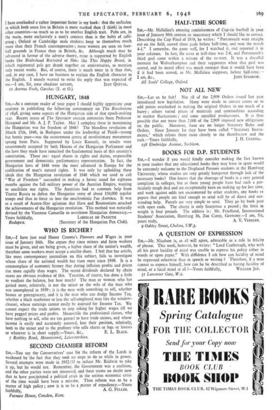WHO IS RICHER?
Sta,—I have just read Honor Croome's Planners and Wages in your issue of January 16th. She argues that since miners and farm workers must be given, and are being given, a higher share of the nation's wealth, therefore some workers must accept a smaller share. I feel that her article, like most contemporary journalism on this subject, fails to investigate whose share of the national wealth has risen most since 1939. It is a commonplace of economic history that during inflation profits and prices rise more rapidly than wages. The recent dividends declared by chain stores are obvious evidence of this. Taxation, of course, has done a little to readjust. the balance, but how much? The man or woman who has gained most, relatively, is not the miner or the wife of the man who was unemployed in 1939 ; it is the man with something to sell, whether houses or greengrocery, and• it is the man who can dodge Income Tax, whether a black marketeer or just the self-employed man like the window- cleaner, whose earnings cannot easily be assessed for Income Tax. We cannot expect the trade unions to stop asking for higher wages till we have pegged prices and profits. Meanwhile the professional classes, who have nothing to sell, who are too genteel to have trade unions, and whose income is easily and accurately assessed, lose their position, relatively, both to the miner and to the profiteer who sells shares or logs or houses or whatever is in short supply.—Yours, &c., E. L. BLACK. 7 Rothley Road, Mountsorrel, Leicestershire.






























 Previous page
Previous page